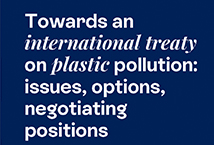- Home
- ESEC SCOPE
- Publications
- Towards an international treaty on plastic pollution: issues, options, negotiating positions
Towards an international treaty on plastic pollution: issues, options, negotiating positions
Visuel

Type of text :
Opinion
Type of referral :
Own initiative
Working group :
EUROPEAN AND INTERNATIONAL AFFAIRS SECTION
Date d'adoption
Date adopted : 04/11/2023
Mandature
2021-2026
Rapporteur(s) :
Photo

Sabine ROUX de BEZIEUX
Photo

Nathalie VAN DEN BROECK
Overview
Présentation
Today, plastic pollution is a growing global problem that requires an urgent international response. Its repercussions, which we are only beginning to understand, represent a major threat to the planet.
The use of plastic products raises major pollution and health issues. It is estimated that today plastic waste accounts for 85% of marine litter and no place on the planet escapes this pollution, including the most remote areas. Similarly, developing countries, although they have less waste per capita, have become major contributors of plastic pollution due to the problems they face in managing waste. The impact of plastic pollution on human health is also a worrying issue. Studies on this subject are still insufficient but often alarmist. Microplastics and nanoplastics can enter the human body.
Today, we find ourselves at an impasse due to its increasing use in all sectors (transport, packaging, construction, etc.). The OECD predicts that global plastic consumption will increase 2.5 times by 2060.
This problem is gradually being taken into account in national legislation (France, African States, European Union, etc.) but can only be resolved within an international framework.
It is in this context that the United Nations Assembly adopted an historic resolution on 2 March 2022: End plastic pollution: towards an international legally binding instrument.
In this opinion, the ESEC proposes the conditions for achieving an effective international text. Its recommendations, the main ones of which are set out below, cover three main areas.